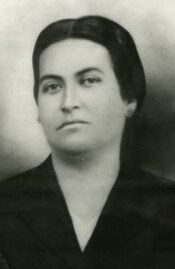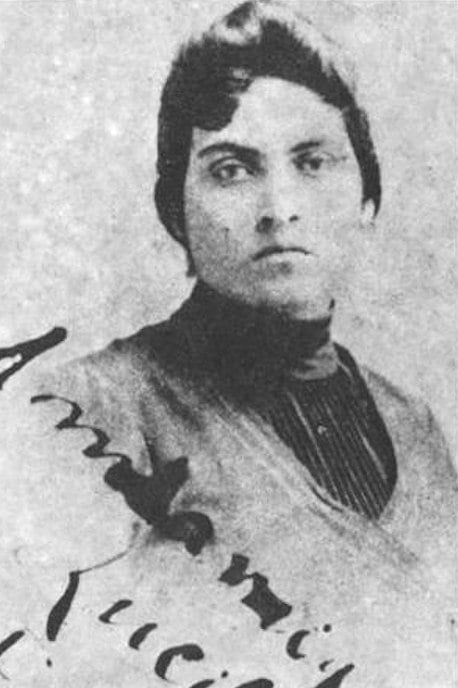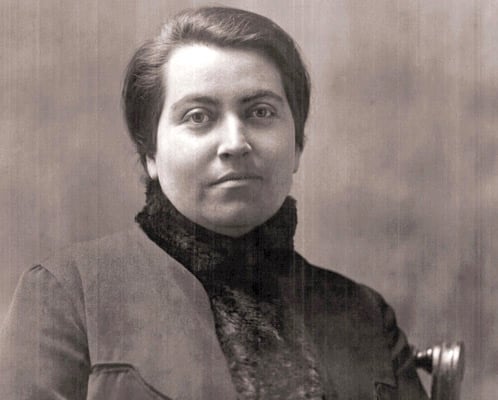The Early Poetry of Gabriela Mistral (Lucila Godoy Alcayaga)
By Nava Atlas | On January 3, 2023 | Comments (2)

Born in poverty, Lucila Godoy Alcayaga could never have predicted the lofty global reputation she would achieve as the Nobel Prize-winning poet Gabriela Mistral (1889–1957). Presented here are several of Gabriela Mistral’s early poems that appeared in regional Chilean publications, primarily from 1905 and 1908, when she was in her teens.
Though there was a gap in her published poetry from 1906 to 1907, she continued to write, contributing prose pieces to local publications, particularly La Serena.
These poems presented here in are in Spanish only, as it’s unclear whether they have ever been professionally translated into English or other languages until now. Perhaps someone will discover them and undertake this worthy task.
An impoverished childhood; a teen poet
Raised in the impoverished Andean village of Montegrande, Chile, three-year-old Lucila’s father abandoned her and her older sister, leaving their mother, Petronila, to raise them alone.
Lucila’s education was erratic, and not very promising — her teachers told her mother that her daughter had no intellectual promise and would do better to learn a trade. And yet, she began working as a teacher’s aide at age fifteen to help support her mother, who was often ill.
It was then that two of her three lifelong passions — poetry and education — took root (the third, diplomacy, would come later). Her earliest poems were published in a local newspaper between 1904 to 1914 — taking her from her mid-teens to mid-twenties.
As a regular contributor to El Coquimbo and its offshoots, Lucila tinkered with various pen names like Soledad (“loneliness”) and Alma (“soul”), settling on Gabriela Mistral (“cold wind) by the time she was eighteen. It was the name that would carry her through the triumphs and tragedies of her life.
. . . . . . . . . . .

Lucila / Gabriela, 1905
. . . . . . . . . . .
Lucila was especially prolific around the ages of fifteen and sixteen. Her poems and prose from that period reveal a preoccupation with death and are tinged with sorrow. It’s as if they were a premonition of what would be the tragedy of her young life.
At age seventeen, she fell in love with a young railway worker named Romeo Ureta. After taking his own life, the only item found in his possession was a postcard Lucila had sent him. This horrific incident scarred her for a very long time.
But life had to be lived, and a living to be earned. She began teaching at a girls’ school and loved the work, paying special attention to the students from impoverished backgrounds. When this came to the attention of the directress of the school, she was taken to task. Her sideline of poetry writing came to light as well, and for some reason this was also a mark against her.
Echoing her childhood experience, the directress assured Lucila that she had no talent for teaching and that her writing endeavors would amount to nothing. She and the school staff harassed the young teacher until she was forced to resign.
Gabriela (when she dropped Lucila) refused to give up teaching or writing. Gradually, she earned official teaching credentials and continued to grow her poetic reputation. She found a teaching position at a secondary school near Santiago, Chile.
The start of a storied career
Never having forgotten the loss of her first love, Gabriela poured her pain into poetry, producing “Sonetos de la Muerte,” three of which would be published and would earn her a national prize for poetry in 1914.
Desolación was Gabriela’s first published collection of poems, published in 1922. After its publication, her fame grew rapidly. Reoccurring themes include love, deceit, sorrow, nature, travel, and love for children.
In 1922, she also accepted the invitation of Jose Vasconcelos, the Mexican minister of education, to create educational programs for students from poor backgrounds in Mexico. As part of this effort, she brought mobile libraries into rural areas to make literature more accessible.
Some of the themes carried through her work were those she explored from the time of her first collection, Desolación, which included, according to Arce de Vazquez: “ … The ideal teacher, the artist and artistic creation, motherhood and children, living beings and materials, the ecstasy of love, the passion of Christ, death, beauty, and the eternal.”
The poems presented here have been discovered via Gabriela Mistral en El Coquimbo, Direccion de Bibliotecas, Archivos y Museos.
. . . . . . . . . . .

Read our full biography of Gabriela Mistral
. . . . . . . . . . .
Canto Fúnebre (Funeral Song)
Hoja marchita que de un árbol muerto
El furor de los vientos arrancó,
Llevándola del mundo en el desierto,
Eso soy yo.
Violeta que al abrir fresca y florida,
El rigor del estío marchito
Y ni el riego ni el Sol le dan la vida,
Eso soy yo.
Gota de llanto que de un alma herida,
Como esencia de duelo se arrancó
Y entre oscuridad rodó perdida,
Eso soy yo.
Ave fatal que la tormenta impía,
Del ramaje su nido le arrojó
Y que vaga sin rumbo en noche fría,
Eso soy yo.
Queja doliente, de algún pecho triste,
Cuyo eco sólo el aire lo escuchó.
Fantasma errante que de negro viste,
Eso soy yo.
Astro eclipsado que un nublado cielo
No luce sus fulgores ni esplendor.
Fatal proscrita, pena sin consuelo,
Eso soy yo.
Cruz que sombreada por ciprés doliente,
Vela una tumba do no nace flor,
Faro sin luz, arroyo sin corriente,
Eso soy yo.
Estrofa amarga, fúnebre fragmento
De algún poema que escribió el Dolor,
Lóbrega noche, agudo y cruel lamento,
Eso soy yo.
(Signed Lucila Godoy Alcagaya, La Compaña, 25 de Febrero, 1905)
. . . . . . . . . . .
Sonrisas de Alba (Smiles of the Dawn)
Todo vuelve a vivir: el alba blonda
Despierta al llano de su triste sueño
Y canta el ave entre la espesa fronda
Y el día asoma lúcido y risueño .
Se abre la flor al rayo que fulgura,
La sombra alza su denso cortinaje,
Y palpita la vida en la natura …
Y se estremece el nido en el follaje.
Aléjase la noche del paisaje,
Un nimbo de esplendor corona el monte
Se baña en luz la aldea aletargada …
¡Sólo de mi alma el lúgubre paraje
No viene a iluminar sus horizontes
El risueño fulgor de una alborada .
(Signed Lucila Godoy Alcagaya, La Compañía, 16 de julio, 1905)
. . . . . . . . . . .
. . . . . . . . . .
Delirios (Delusions)
Acérquenme a la luz, a mi ventana,
Quiero mirar el mar, mirar el Sol,
Contemplar el albor de la mañana,
Ver como a su fulgor se abre la flor.
Quiero aspirar la brisa de la tarde
Que viene a perfumarse en mi jardín,
Sentir su beso aquí en mi frente que arde,
Llena por una inspiración sin fin.
Acérquenme hacia allá, quieren mis ojos,
Mirar la noche, darle mi dolor,
Contarle mis tristezas, mis enojos,
Y que llore en su sombra el corazón.
Quiero sentir el canto de las aves,
Mirar los cielos con su manto azul,
Y en el silencio engrandeciente y grave
Cantar mi desolada juventud.
Quiero escuchar las quejas de las olas
Ver la lívida tarde agonizar,
Vagar como antes por la playa sola,
Y muchas cosas preguntarle al mar.
Si he de morir, quiero morir cantando
Al campo, y a sus flores; y al dolor,
No veis que junto al lecho está velando,
La sublime y amante inspiración?
Quiero morir la lira contra el pecho,
El ensueño en la mente como flor,
Y que miren mis ojos desde el lecho,
El alba, el mar, el campo, el cielo, el Sol!
(Signed Soledad, La Compañía, septiembre, 1905)
. . . . . . . . . . .
Del Pasado (From the Past)
¿Por qué pasaron, mi querida Delia,
las dulces horas, los tranquilos días
en que fue tu amistad campo de flores
que ante mis tristes ojos entendías?
¿Dónde quedó, perdida en los zarzales
de mi suerte de paria, aquella vida,
como la del Edén dulce y serena,
como la del Edén, también perdida ?
¡Ya no puede tornar!
Así lo dice cruel en mi oído un eco misterioso;
no vuelve nunca aquello que se llama,
cae en la muerte cuanto ha sido hermoso.
Veré empezar y terminar los años,
y morir una y otra primavera,
y seguiré aguardando… pero en vano,
te he perdido por siempre iquién creyera!
Otro es mi hogar, y será el tuyo en breve
otro nuevo también, bajo otros cielos;
otro es tu corazón, otros los seres
a quienes tu virtud dará consuelos.
Nada queda del fúlgido pasado
un recuerdo, es verdad, pero en mí solo,
pues de mi cruzamiento en tu camino
borras las huellas, cual se borra un dolo.
Y las flores de bien, que derramaste
en mi existir, no fueron, no, perdidas,
y gratitud te guardo, aunque eres otra,
y mi afecto también, aunque me olvidas.
¡Soy muy falta’! Parezco una maldita
Mi martirio aventaja a otros martirios
Es sin luna mi noche, y es mi invierno
sin violetas, sin juncos y sin lirios.
Hay inmensa razón en tu abandono:
¿qué harías compartiendo mi existencia
si no sentir al par de mi desdicha
y sollozar al par de mi dolencia?
¿A do irías conmigo? Al hondo abismo
en él, al fin se detendrán mis pasos,
otra mártir serías, como aquella
que ha veinte años me apoya con sus brazos.
¡No existe la amistad! Es fugaz lampo
que un instante ilumina y desaparece;
no existe esa amistad eterna y noble que
encontrar en el mundo nos parece.
Hoy comprendo bien, hoy, presencio
la ruina de mi sueño más querido
hoy que asisto al trastorno de tu alma,
toda ternura ayer, y hoy toda olvido.
¡Ah! déjame llorar, así aferrada
a mis recuerdos caros y angustiosos.
Puedo pasar el resto de mi vida
esos lapsos cantando, tan dichosos!
(Signed Gabriela Mistral, La Serena, 23 de julio 1908)
. . . . . . . . . . .
Rimas (Rhymes)
De mi fatalidad para el auxilio
hacia el cielo clamé,
y, por un largo tiempo, la quimera
luminosa aguardé.
Cansada de esperar, me dije: Indigna
soy de tal protector
y al averno grité, fue tan sensible,
como el otro a mi voz.
Quise en la confusión de las ciudades
mi angustia adormecer;
a ellas fui, y autómata, aturdida,
por sus calles vagué.
Y me hirió su avalancha febricente
como un yunque brutal;
y huí enloquecida hacia mi madre,
mi madre Soledad.
Y es mi vida de calma y de silencio
cayó el cuervo dolor,
festín no interrumpido hace hora a hora
aquí en mi corazón.
¿A do iré? Negra sombra me persigue.
A Jehová no oí
maldecir mi existencia, pero siento
que, en verdad soy Cain.
(Signed Gabriela Mistral, La Serena, 20 Octubre de 1908)
. . . . . . . . . . .
Después de la Lluvia
Cesó la lluvia de caer. La brisa
ora la humedad de la llanura:
la huella de mis llanto y mi amargura
en mi rostro no borra la sonrisa.
Como si fuera un fardo de dolores,
dejan caer las rosas su rocío.
y yo le digo al cielo: “El fardo mío
hacer pudiste cual el de esas flores”
El Dios Invierno con su mano artera
luto dio al cielo azul y al alma mía:
ése, lo ha soportado sólo un día,
ella, lo ha de llevar la vida entera!
(Signed Gabriela Mistral, La Serena, 27 de Octubre, 1908)
. . . . . . . . . . .

9 Poems by Gabriela Mistral on Life, Love, and Death
. . . . . . . . . . .
Images in this post courtesy of Wikimedia Commons
Where is her poetry in English??
Victoria, my apologies, when I shared this on FB I forgot that this post has only her early poetry in Spanish, which has yet to be properly translated. I changed that link to a post with a sampling of her poetry in both English and Spanish: https://www.literaryladiesguide.com/classic-women-authors-poetry/10-poems-by-gabriela-mistral-about-life-love-and-death/